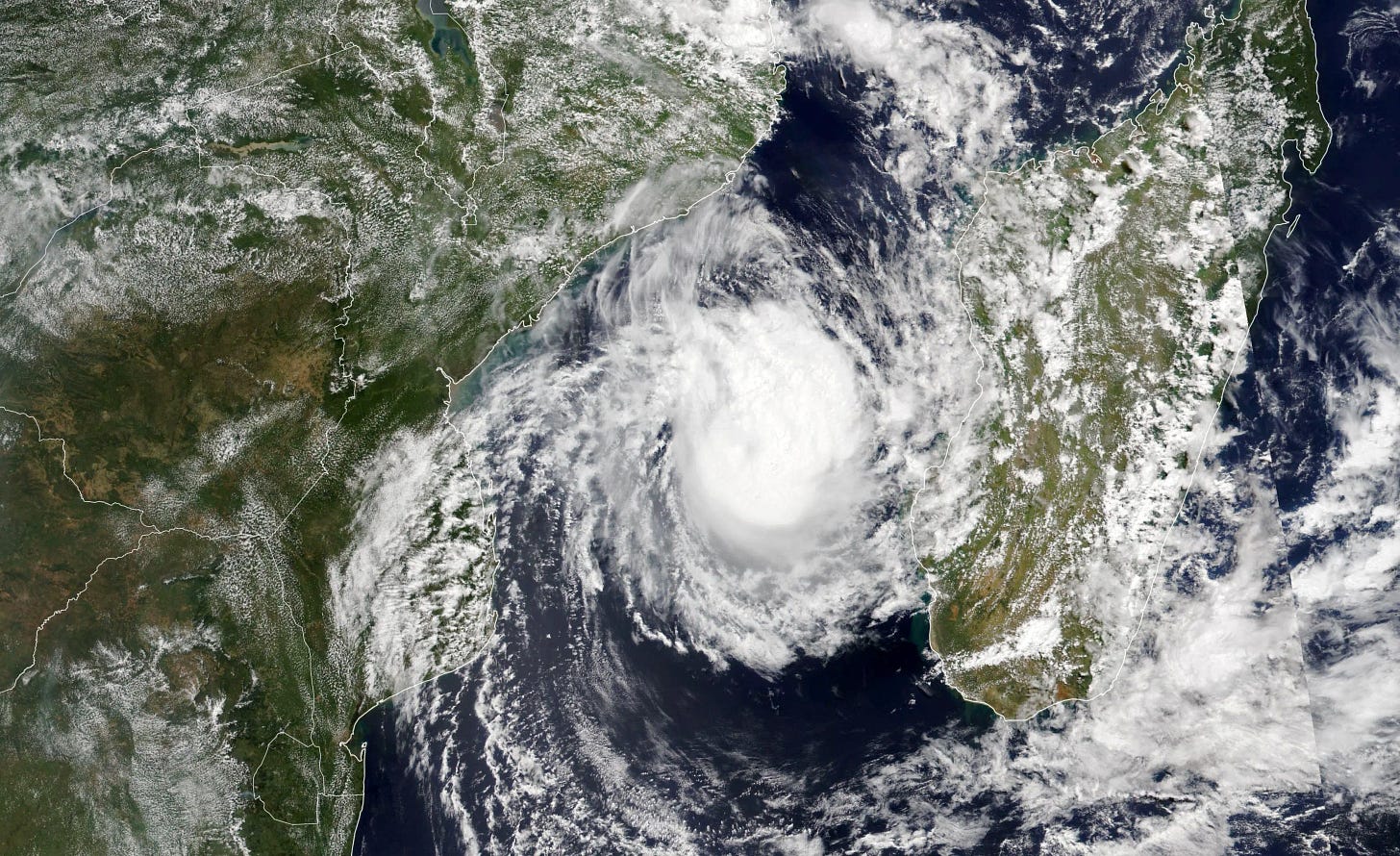I source news from a variety of places, most of them with either affirmed or obvious-if-unacknowledged political and editorial bias. One that purports to strive to neutrality and lack of embellishment is 1440, and I get a daily digest sent to my inbox every morning.
One snippet was the impact of Cyclone Freddy, which clobbered Malawi, Mozambique, and Madagascar, killing a reported 270 and doing the harm that such storms do when they intersect with population. What caught my eye was this assertion:
Freddy developed off the northern coast of Australia in early February before traveling over 4,000 miles across the southern Indian Ocean—only the fourth storm ever to do so—to southern Africa.
"Ever" is a long time. It's also a routine deceit in weather-news reporting, as are "records" i.e. biggest, strongest, most harmful, and contributes to the bevy of debunked claims that hurricanes are getting stronger due to human carbon emissions. The reality is that we've only had the ability to record weather on a global basis, including across the vast swathes of ocean, for half a century or so. Measured against the age of the earth, our window of awareness of global weather phenomena is akin to the last one-thousandth of a second of a twenty-four hour day. We cannot know how many cyclones traversed the breadth of the Indian Ocean prior to the "eyes in the sky" we've been launching since the 1960s.
We've only had the data to develop good estimates of global temperaturess for about 140 years, meaning that indirect methods involving ice cores, tree rings, sedimentary deposits, and other natural 'records' are used. Science, being always in a state of trying to get better, gives us a decent picture of the past, but it cannot* compare with the mountains of direct measurement data we collect today. As we look further and further backward, the error band grows bigger and bigger.
I don't intend, here, to dismiss or debunk global warming theory, though it does amuse me that Greta Thunberg reportedly just deleted a climate catastrophe tweet from 2018 about 2023. There's missing context and a bit of misquotation therein, but it just adds to the long list of missed doomsday predictions. I do, however, seek as always to rein in the excesses.
Why bring this up? Why quibble with the use of "ever" in mentioning Freddy's oceanic traverse?
Because it's at best sloppy writing, and such are oftentimes deliberately misleading hyperbole. Reporters are, by and large in my estimation, far too ignorant on the topics they write about so authoritatively. If you've ever been on the inside of a news story of any controversy, you've very likely witnessed how wrong they get things. In a case such as Cyclone Freddy's, there really is no excuse. I offer no secret knowledge here, just a teeny bit of perspective that anyone with a grade school education should have.
However, as is evident, those who'd alter our behavior routinely turn to fear-mongering via the aforementioned hyperbole in order to sell their conclusions.
Is it hyperbole to predict planetary catastrophe from anthropogenic global warming?
Yes.
Not only have decades of short-term predictions failed to materialize, there's plenty of reason to believe humanity is more than capable of adapting to climate change (natural or man-made) as it's emerging. But, even if you disagree, and read in the 'science' a greater threat than I do, it's proper that you maintain a perspective with regard to reality. The case should be made with honesty and loyalty to facts and data, not with excesses such as an assertion of "ever" that spans less than an eye blink of the planet's existence - or of humanity's existence, if you want a shorter time frame. Those 50 years of global storm record are to the human species' 150,000 years of existence what thirty seconds are to a twenty-four hour day.
Reason, perspective, and acknowledgment that weather events didn't only start to happen when humans started noticing them. If a tree falls in the forest with no one around, it does make a sound.
Next time someone says "this storm is the worst ever," just ask "how do you know?"





I'm barely in my 60's and I think back to when I was a teen and young adult. The only way I would hear about a natural disaster would be if my local newspaper or TV news covered it, and I just happened to take note that day. I mean, when I got the Sunday papers the first thing I did was pull out the sports page and comics and head to the bathroom. Box scores took a while to read so I didn't often get to the latest typhoon news from the Philippines. I guess my point is that every incident today is world-wide news whereas a hundred years ago nobody in the world knew about it other than the places affected.
I'm also a window flyer on airplanes. I'm fascinated by watching the landscape below. What I've noticed flying to the west coast is that apparently there looks to be a lot of water in the past that cut canyons out, probably way before man existed. Anyone who can look at that and then try to definitively quantify how much damage humans have done just doesn't get the power of the planet.
“Ever,” is, indeed, a long time. Wonderful piece.